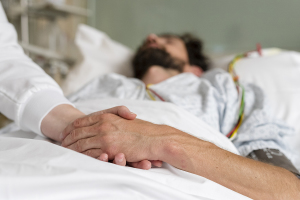The Christian case for universal healthcare
The debate over healthcare has become a major issue in our country. Our private healthcare system is extremely overpriced and does not provide the quality of care one would expect. It hardly reflects a Christian ethic, yet many Christians continue to support it.

If we really think about it, our current healthcare system thrives on people’s misfortune. Hospitals, doctors and insurance companies make huge profits by exploiting those born with poor health or experiencing an illness beyond their control. No one expects hospitals and doctors and insurance companies to offer their services for free, but no one expects them to gouge their patients when they are most vulnerable either.
The government refuses to implement price controls, which, in essence, gives a green light to hospitals, doctors and insurance companies to charge whatever they wish. They charge what they want to because they can get away with it. They are accountable to no one. And who is to stop them? That explains the relentless rise in health care costs year after year.
In 2003 President Bush signed into law the Medicare Modernization Act which forbids the Secretary of Health and Human Services from negotiating prices of drugs with drug makers. That law has only exacerbated the problem and has certainly been a boon for the pharmaceutical industry.
Many are now calling for a government-run, universal healthcare system because the issue of rising healthcare costs has gotten out of control. But as might be expected, critics call this idea “un-American.” For them, it’s better to be “American” and exploit another person for personal gain than be “un-American” and help people struggling with being able to afford health care.
Transitioning to a universal healthcare system is a socialist approach to the problem. There is no denying that. But why is there vociferous objection to such an approach? In the Book of Acts in chapter 2:45, Christians pooled together their goods and money to help those in need. That was a form of socialism. This would be replicated in a universal healthcare system. All the citizens of our country would pay into the system.
Our public education system is a form of socialism. Property taxes are pooled together to pay for the public education of our children until they graduate from high school. It is assumed that their education is a right. We have socialized education at this level. Why not socialize our healthcare system so everyone can receive basic medical care?
To a certain degree, our country already has a socialized healthcare system: Veterans Administration healthcare. I have used the healthcare services of the VA since I am a veteran. I have to say that the quality of care I have received has exceeded the quality of care I have received in the private sector. The doctors are more caring and spend more time with patients than private doctors. The five-minute, three hundred dollar visit to the doctor is unheard of there. The doctors are less likely to order unneeded medical tests. The VA is not profit driven and does not derive any ridiculous monetary gain from my misfortune. The idea that profit plus private equals quality simply is not true.
In the article “More Money, Same Results,” in the Harvard Gazette, researchers at Harvard Medical School and the Harvard T.H. Chan School of Public Health concluded that higher healthcare costs do not equate to better outcomes. “If you spend more money on a car or a TV, you tend to get a nicer car or a better TV,” said senior author Anupam B. Jena, the Ruth L. Newhouse Associate Professor of Health Care Policy at Harvard Medical School. “Our findings show that’s not the case when it comes to medical care. Spending more doesn’t always mean you get better health.”
The argument that capitalism can fix the problem without any government interference is wishful thinking. Actually, unregulated capitalism was the cause of the financial crisis in 2008-2009. Businesses did a very poor job of regulating themselves. Today, the same holds true with hospitals and insurance companies, which are businesses. If it is true that capitalism is the panacea to all our nation’s problems, why did the government have to get involved in the financial crisis of 2008-2009 and impose regulations on the financial industry? The entire healthcare system needs oversight from an outside party such as the government to regulate it. Hospitals, doctors and insurance companies are incapable of regulating and policing themselves, especially when it comes to controlling high costs.
Universal healthcare in our country would be more humane than our current private healthcare system. The amount of bankruptcies filed by people who are unable to pay their medical bills would dramatically decrease. A person would not have to worry about declaring bankruptcy because of the cost of treating a broken arm. A sick person would not have to spend hours on the phone arguing with an insurance company about paying for a necessary medical procedure or what is and is not covered under their medical plan. Doctors and insurance and hospital executives would not be able to gobble up a person’s entire lifelong savings because of an unforeseen illness.
The argument that healthcare in countries with universal healthcare is much worse is completely false. Those who benefit the most from the way things are now in our healthcare industry intentionally disseminate this false information. Sad to say, many Americans believe them. It is time for Americans to think for themselves and do their research before putting their trust in the rhetoric of hospital and insurance executives.
My wife had pneumonia while we lived in Russia and went to be treated at a hospital in Finland. The care she received was excellent and cost half of what it would have cost had she received the same treatment in the United States. Other countries such as Sweden, Germany, and Denmark have better quality healthcare systems. Just look at the metrics of patient outcomes and longevity. Other countries fair better than our country. The notion that America has the best healthcare system in the world is a myth.
A major obstacle that has to be torn down so our country can move forward with healthcare is the powerful healthcare lobby. It has a stranglehold on the members of Congress. Those who have the most to gain from our current healthcare system will not go down without a serious fight, however. Multi-million dollar salaries and billions in profits are at stake here. The “American way” is threatened.
But the “American way” is not the Christian way. Universal healthcare is more aligned with Christian values than our current system. Christians espouse “look out for the interests of others (Phil. 2:4) …do unto others as you would have them do unto you (Matt. 7:12) …love your neighbor as yourself (Matt. 19:19)…carry each other’s burdens (Gal. 6:2)…do not boost the price (Amos 8:5)…defend the rights of the poor and needy (Prov. 31:9).”
The fact that there is public discussion about healthcare means that serious problems exist in our present healthcare system. The current democratic presidential candidates who advocate universal healthcare are responding to the public’s outcry. The status quo approach to solving the healthcare issue has not worked for years. That approach has to change since the current system is unsustainable.
The transition to universal healthcare is inevitable because the public outcry against the current system will get louder, much louder. Healthcare costs will continue to rise unchecked, and employers will pass more and more of those costs on to their employees. When all is said and done, though, the hospitals, doctors and insurance companies will have only themselves to blame for our nation’s adoption of universal healthcare. Their greed will lead to the eventual demise of private healthcare.
If the current presidential administration remains in power for four more years and does nothing to address the issue of healthcare in a significant and meaningful way, it will only get worse and make the call for universal healthcare that much more urgent. Unfortunately, as of right now, the mentality of many of our political leaders is “Yes, it’s unfortunate you have a bad medical condition, but deal with it. Such is life. Good luck.” Do we Christians agree with that?



























